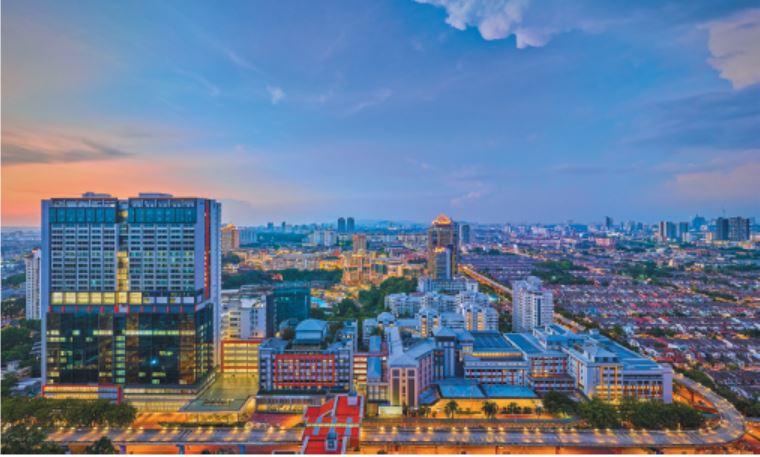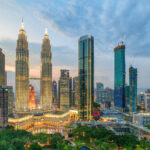Sunway Group, a sustainability-focused company in Malaysia, celebrates its 50th anniversary this year and looks to the future with a resolute commitment to the triple bottom line.
As climate change accelerates at an unprecedented pace, the global push by governments and companies to achieve net-zero emissions by 2050 has gained momentum.
Sustainability has become a key corporate mission, laying the foundation for responsible strategies that drive long-term growth, improve risk management, and strengthen stakeholder trust and brand loyalty.
As the need for corporate commitment to sustainability grows, environmental, social and governance (ESG) factors have become critical to corporate decisions and have become a key driver for investors seeking sustainable investment opportunities.
Major companies around the world have increasingly embraced ESG principles to build resilient, sustainable economies. A 2022 KPMG survey found that 96% of the world's largest companies actively report on sustainability – a clear indicator of how important ESG has become.
In Southeast Asia, robust economic growth and rapid urbanization in recent years have increased the region's vulnerability to climate change.
Malaysia is also increasing its focus on sustainability as it aims to transition to a low-carbon, climate-resilient economy by 2030, with a commitment to reduce carbon intensity as a share of GDP by 45%.
Although Malaysia accounts for only 0.69% of global CO2 emissions, its per capita emissions are still relatively high at 8.6 tonnes per person – almost twice the global average – highlighting the urgent need to reduce emissions to reduce.
The Malaysian government's recent Budget 2025 initiatives support decarbonization through strong tax incentives for carbon capture, utilization and storage activities, as well as the RM1 billion (US$230 million) Green Technology Financing Scheme.
These efforts will be further strengthened by the National Energy Transition Facilitation (NETR) Fund, with a dedicated allocation of RM300 million (US$68 million) to promote sustainable environmental protection.
Malaysia's largest federal budget of RM421 billion (US$96 billion) reflects the ambition to drive inclusive and sustainable economic development.
Sustainability-oriented business environment
In today's sustainability-focused business landscape, companies must align with ESG principles to remain competitive for the long-term viability of their business.
Malaysia's Sunway Group celebrates its 50th anniversary this year, demonstrating how aligning business success and sustainability can help a company build resilience and thrive in changing environments.
Over its five decades, Sunway has grown from a tin mining and quarrying company into a multifaceted conglomerate with 13 industries, including construction, real estate development, retail, leisure, hospitality, healthcare and education.
Sunway integrates the United Nations (UN) Sustainable Development Goals (SDGs) and ESG goals into its business core, recognizing their complementary nature as pillars for driving meaningful and lasting growth.
“At Sunway, we view the ESG disclosure and compliance framework as one of the more effective tools and a means to an end, namely the SDGs. More importantly, we view ESG as a data-driven sustainability mechanism that facilitates disclosures and promotes transparency,” says Sunway’s 2023 Sustainability Report.
“Disclosures allow stakeholders to see how companies are responding to pressing environmental, social and governance issues. We believe that transparency creates responsibility and creates trust. In other words, transparency fosters collaboration with our stakeholders and helps keep the company on track to stay relevant in an ever-changing environment,” the report said.
For a more resilient supply chain, Sunway works with its business partners across the group to promote the adoption of sustainable practices.
The company's Real Estate Investment Trust (REIT) arm, highly regarded by analysts and investors for its large and diversified portfolio, works with its tenants under a green lease focused on energy efficiency, water conservation and waste diversion.
Its retail arm, a major player in the mall business, introduced a tiered learning program focused on improving sustainability in the retail sector.

Building sustainable cities
According to the United Nations, cities and urban centers are home to almost 60% of the world's population and are responsible for over 70% of global CO2 emissions. By 2050, nearly 70% of the world's population will live in cities, with significant urbanization occurring in Africa and Asia.
Malaysia is expected to have over 80% of its population living in cities and urban areas by 2030. As urbanization advances, cities are at the forefront of addressing environmental and social issues to create livable, inclusive, sustainable and resilient urban areas.
Sunway has built its enduring success by pioneering a sustainable approach to urban planning, starting with Sunway City Kuala Lumpur, an abandoned former tin mine in the 1980s. Today, this award-winning sustainable community serves a population of 200,000 people.
As the country's first integrated sustainable community, Sunway has set the benchmark for cities in Malaysia and beyond. With the SDGs at its core, the company integrates its net zero targets and sustainability commitments into community master plans, which include green building and community policies and water management.
Sunway's approach focuses on the social and environmental aspects of its communities and includes the preservation of natural landscapes, renewable energy, water security, sustainable transportation and efficient waste management, as well as providing connected walkways to its communities in the areas of healthcare, education, retail and other essential services .
With a unique build-own-operate business model, Sunway is committed to playing a role in ensuring good governance for its communities and regularly invests in projects that promote socio-economic development and environmental protection.
Located in the northern state of Perak, the company's second township, Sunway City Ipoh, has a gross development value of RM2 billion (US$460 million) and an additional investment of RM4 billion (US$920 million) to support sustainable socio-economic growth in the next decade.
As the population grew, Sunway and the Perak state government invested more than RM28 million (US$6.73 million) in road development and expansion projects to ease traffic congestion caused by urbanization in surrounding areas.
In southern Malaysia, Sunway City Iskandar Puter i is one of the largest projects in Southeast Asia, with an estimated gross development value of RM30 billion (US$6.9 billion).
The city, at the center of Johor's economic growth, is home to a fully carbon-neutral free trade zone that is expected to create at least 13,000 jobs and serve as a leading distribution hub for Southeast Asia.
The ongoing development of the Johor Bahru-Singapore Rapid Transit System (RTS) link, once completed, will improve convenience and accessibility for the city's expected 250,000 residents.
The role of cities in addressing environmental and social problems will continue to increase as the rate of urbanization increases. Adopting an SDG or ESG-based approach can provide a structured roadmap for transforming urban developments and governance.
Leading the way for sustainable finance
Southeast Asia's financial sector is increasingly emphasizing ESG considerations in investment strategies, driven by the need to address climate change, labor practices and social issues. Green, social, sustainable and sustainability-related debt issuance has increased, with the ASEAN+3 market accounting for 18.9% of the global market, according to the World Bank.
Malaysia's growing adoption of sustainable finance includes significant advances in sustainability-linked Sukuk, which are Shariah-compliant, asset-based instruments similar to bonds. The Securities Commission Malaysia reports that such issuances have exceeded RM18.92 billion (US$4.3 billion) since 2014.
Sunway actively contributes to sustainable financing through collaborations that integrate ESG principles. In May, the company issued a RM400 million (US$90.8 million) sustainability-related sukuk to expand its healthcare group and secure green building accreditation by 2030.
Sunway's healthcare division is a star in the company's portfolio, with revenue forecast to reach RM2.3 billion (US$525 million) by 2025. It is also expected to become the fourth company to go public by 2027, joining Sunway's current three listed companies. listed companies with a combined market capitalization of more than RM38 billion (US$8 billion).
In a landmark move, Sunway-REIT launched Malaysia's first sustainability-linked perpetual securities in October, raising RM500 million (US$114 million). This innovative step highlights Sunway's ability to advance sustainable financing.
To accelerate its group-wide decarbonization efforts, Sunway aligned its financial practices with environmental goals by becoming the first company in Malaysia and one of the first in Asia to introduce an internal carbon pricing model, demonstrating the company's active leadership in sustainability.
As ESG factors continue to shape the business landscape, companies would be wise to remain agile and adapt to changing environments and evolving expectations.
By aligning with global trends and embracing holistic ESG integration, companies can build resilience, unlock new growth opportunities and drive long-term business success.
